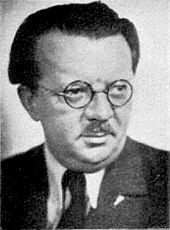Hubert Birch
Hubert Hermann Birke (born January 21, 1892 in Hermsdorf ; † April 13, 1950 in Doschendorf ) was an Austro-German politician ( NSDAP ) and dialect poet.
Live and act
After attending primary school , Birke earned his living as a factory worker and factory employee, and later as a freelance writer. In addition, he attended various specialist courses. At the First World War he took from 1915 to 1918 as a reserve officer in the mountain artillery part. He was deployed in Romania and Albania . After the end of the war, Birke became chief editor of the newspapers in East Bohemia, Deutscher Bote and Völkische Rundschau, in Braunau in 1919 .
Politically, he was initially active in the German National Party (DNP), of which he was part of the party leadership in Eastern Bohemia and, at times, of its overall party division. From 1928 he was a member and administrator of the DNSAP until the party dissolved itself in autumn 1933. In October 1933 Birke became a member of Konrad Henlein's Sudeten German party (membership number 41). In 1935 Birke was elected to the Czechoslovak Parliament for the Sudeten German Party . In 1936 and 1937 he took on tasks as district leader of the SdP in East Bohemia. Also in 1937 he became a member of the main leadership of the SdP and head of the main office of the party for social policy.
After the German annexation of the Sudeten areas in the autumn of 1938, Birke became the general representative of the “standstill commissioner” for trade unions as well as the representative of Gauleiter Konrad Henlein for the DAF . On the occasion of the supplementary election to the Greater German Reichstag on December 4, 1938, Birke was elected to the National Socialist Reichstag , to which he was a member until the end of the Nazi regime in spring 1945. He joined the NSDAP after the incorporation of the Sudeten areas into the German Reich at the end of January 1939. He took on duties as Gauamtsleiter and Gauobmann of the German Labor Front (DAF) in the Sudetenland. In 1942 he was appointed SA Standartenführer. In addition, on January 30, 1943, he received the Golden Party Badge of the NSDAP . He was made an honorary citizen of Braunau in Bohemia .
literature
- Joachim Lilla , Martin Döring, Andreas Schulz: extras in uniform. The members of the Reichstag 1933–1945. A biographical manual. Including the national and national socialist members of the Reichstag from May 1924. Droste, Düsseldorf 2004, ISBN 3-7700-5254-4 , pp. 41–42.
- Joachim Lilla : The representation of the “Reichsgau Sudetenland” and the “Protectorate of Bohemia and Moravia” in the Grossdeutsche Reichstag . In: Bohemia . Journal of History and Culture of the Bohemian Lands , Volume 40, Issue 2, 1999, p. 454.
Web links
- Hubert Birke in the database of members of the Reichstag
- Literature by and about Hubert Birke in the catalog of the German National Library
Individual evidence
- ↑ a b c Joachim Lilla: The representation of the "Reichsgau Sudetenland" and the "Protectorate of Bohemia and Moravia" in the Greater German Reichstag . In: Bohemia. Journal of History and Culture of the Bohemian Lands , Volume 40, Issue 2, 1999, p. 454
- ^ Klaus D. Patzwall : The Golden Party Badge and its honorary awards 1934-1944. Studies of the history of awards Volume 4. Verlag Klaus D. Patzwall, Norderstedt 2004, ISBN 3-931533-50-6 , p. 64.
| personal data | |
|---|---|
| SURNAME | Birch, Hubert |
| ALTERNATIVE NAMES | Birke, Hubert Hermann (full name) |
| BRIEF DESCRIPTION | German-Austrian politician (NSDAP), MdR |
| DATE OF BIRTH | January 21, 1892 |
| PLACE OF BIRTH | Hermsdorf |
| DATE OF DEATH | April 13, 1950 |
| Place of death | Doschendorf |
